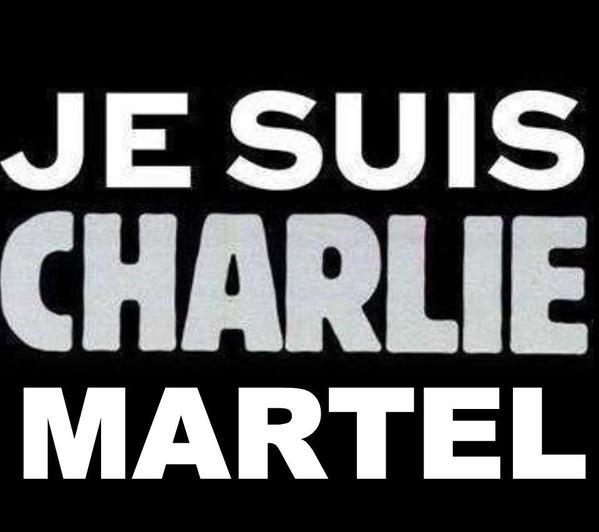#JeSuisCharlie? I hope not.
Charlie Hebdo, the satirical French magazine that was the victim of a violent terrorist attack in January that left twelve dead, will no longer produce images of the prophet Muhammad, according to its editor Laurent Sourisseau.Translation: It's far safer and more popular to attack targets like the "far Right" or Catholics than it is to attack Muslims. So like most modern "satirists," we'll stick to attacking the enemies of the political class.Speaking to German magazine Stern, Sourisseau said that the magazine has “done its job” and “defended the right to caricature.”“We have drawn Muhammad to defend the principle that one can draw whatever they want. It is a bit strange though: we are expected to exercise a freedom of expression that no one dares to,” Sourisseau said.Still, he said he didn’t want people to perceive the magazine as being “possessed by Islam.”
“The mistakes you could blame Islam for can be found in other religions,” he continued.
[Charlie Hebdo will no longer publish images of the Prophet Muhammad, by Anna Silman, Salon, July 20, 2015]
It's important to recognize this wasn't just about surrendering to fear of Islamic terrorism. It was about surrendering to fear of being called "racist."
The relentless campaign against Charlie Hebdo by those accusing it of “racism” or “punching down” has had an effect. Because once deployed, as the surviving staff of Charlie Hebdo discovered, the racism charge sticks to the accused’s skin like napalm. And no one is immune — even murdered cartoonists — because there are no penalties for filing a false report. So if they expected unmitigated solidarité after their staff was machine gunned (while planning their participation, it should be noted, in an anti-racism event), they were surely disappointed when non-Francophone writers who hadn’t previously heard of Charlie exploded with denunciations of its racist intent. The most profane mainstream examples compared staffers with raping colonialists and genocidal Nazis.All the marches and expressions of hashtag solidarity really signified was a vague discomfort with the tactics of the Islamic terrorists. Post-modern Europeans, self-loathing journalists, and sociopathic politicians don't want people running around in the street with guns. It raises uncomfortable questions and makes things messy. But The Powers That Be fundamentally shared the bottom goal of the terrorists, which was marginalizing indigenous Europeans within their own countries and replacing them with a foreign people and foreign culture.When the American franchise of PEN, a literary association devoted to the defense of free speech, bestowed an award on Charlie Hebdo celebrating it’s courage, over 200 members revolted, conflating the magazine’s attacks on religious fanatics with attacks on average French Muslims, a group “already marginalized, embattled, and victimized.” (One PEN dissenter, novelist Randa Jarrar, demonstrated her grasp of the subject matter when she referred to “Charlie Hebdo” as a person who had unconvincingly denied “his” racism.)
[Charlie Hebdo waves the white flag, by Michael Moynihan, Politico, July 20, 2015]
So Charlie Hebdo never had any support for its actual message or even for the principle of free speech. How could it, when the French government already bans things deemed "offensive" to Muslims?
The entire pathetic spectacle only reinforces the point that European liberty will not be saved by liberals (classical or otherwise) but by a movement that puts European Identity first. In the end, Identitarians are the only ones willing to say that Europeans have a right to fight (or speak) in their own defense.

A More Useful Slogan for the French